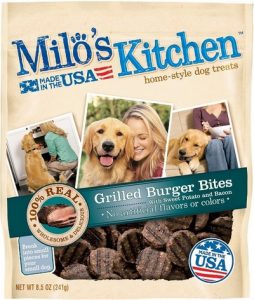On March 27, 2018, the J.M. Smucker Company initiated a recall of certain Milo’s Kitchen dog treats due to the presence of thyroid hormones.
Prior to the recall, the FDA received reports of four dogs experiencing symptoms, including excessive thirst, excessive urination, increased appetite, and restlessness. Three of the dogs were tested and had increased concentrations of thyroid hormone in their blood, also known as hyperthyroidism. The fourth dog was not tested, but was suspected to also be suffering from hyperthyroidism. After the pets’ veterinarians ruled out thyroid cancer as the cause, the FDA determined the hyperthyroidism was connected to an external source, such as a food. The FDA’s Vet-LIRN interviewed the dogs’ owners and confirmed that all of the dogs ate at least one of the recalled pet treat products from Milo’s Kitchen. Once the Milo’s Kitchen treats were removed from the dogs’ diets, the hyperthyroidism symptoms resolved.
The recalled products were distributed to retailers nationwide. The list of recalled products the firm provided to the FDA include:
- Milo’s Kitchen Home-Style Dog Treats Steak Grillers Recipe with Angus Steak, 18-ounce bag, UPC 0 7910051822 7, Best If Used By 11/15/2018, Lot #7413
- Milo’s Kitchen Home-Style Dog Treats Steak Grillers Recipe with Angus Steak, 18-ounce bag, UPC 0 7910051822 7, Best If Used By 4/26/2019, Lot #7305
- Milo’s Kitchen Home-Style Dog Treats Steak Grillers Recipe with Angus Steak, 22-ounce bag, UPC 0 7910051823 4, Best If Used By 4/26/2019, Lot #7305
- Milo’s Kitchen Home-Style Dog Treats Steak Grillers Recipe with Angus Steak, 10-ounce bag, UPC 0 7910052776 2, Best If Used By 4/26/19, Lot #7305
- Milo’s Kitchen Home-Style Grilled Burger Bites with Sweet Potato and Bacon, 15-ounce bag, UPC 0 7910052126 5, Best If Used by 11/19/18, Lot #7417
In previously reported cases of exogenous thyrotoxicosis (hyperthyroidism caused by an external source) in dogs, testing of the food the dogs ate revealed detectable thyroid hormones. Pet food with increased concentrations of thyroid hormones likely contains animal gullets (laryngeal tissue) obtained most often from beef and lamb slaughter establishments used in the manufacture of pet treats and pet food. If a thyroid gland is not completely removed from a gullet and that gullet is then added to pet food or treats, remnant thyroid tissue could be a source of thyroid hormones.
The FDA’s evaluation of the test results of Milo’s Kitchen treat samples indicates that the treats contain thyroid hormones in substantial amounts. Consuming these treats can trigger hyperthyroidism in dogs. Hyperthyroidism caused by pet food or treats is generally reversible if the dog stops eating the product containing thyroid hormones, but prolonged consumption may result in permanent heart damage and death. The FDA has previously issued a Letter to Industry to remind pet food manufacturers and suppliers that any products containing livestock gullet or laryngeal tissue can be a source of thyroid hormones. The FDA has also issued a Letter to Veterinary Professionals to ensure that veterinarians are on the lookout for exogenous thyrotoxicosis.
Pets that eat food containing thyroid hormones may develop hyperthyroidism, a disease that is rare in dogs and usually triggered by thyroid cancer. Symptoms of hyperthyroidism include excessive thirst and urination, weight loss, increased appetite, restlessness, hyperactivity, aggressive behavior, elevated heart rate, rapid and/or labored breathing, vomiting, and diarrhea. Continued exposure to excess thyroid hormones can cause damage to the heart and in some cases, death.
Consumers should not feed their pets the recalled lots of Milo’s Kitchen pet treats. Consumers who purchased these products should safely dispose of the treats in a way that children, pets and wildlife cannot access them, or contact the firm for information about returning the product. Pet owners who think their pets may be ill from eating treats containing thyroid hormones should contact their veterinarians.
The FDA encourages consumers to report complaints about this and other pet treats or food products electronically through the Safety Reporting Portal or by calling their state’s FDA Consumer Complaint Coordinators.
See the full FDA Alert for this recall HERE.


